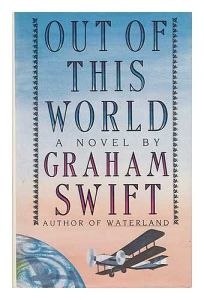
Out of This World
By Graham Swift
212 pages
Published in 1988 by Viking Penguin
I found it among the bookshelves in the family room of our house in Nicaragua. I selected it because it was the size I was looking for (less than 300 pages) and because I liked the sound of the author’s name. Graham Swift. Very promising.
Books, like people, have very different personalities. There are some that take time to warm up to. And there are others that are instantly likeable. For me, Out of This World is one of the latter.
I liked it immediately because it was beautifully written. I’m talking about the paragraphs and the sentences. They are polished gems. Each one is its own pleasure. And the thoughts and perceptions behind this beautifully crafted language are so damn good.
If you read books primarily for plot and action, though – if you are a John Grisham fan, for example – you may not like this book. The plot… well, it doesn’t really have a plot. There are two stories that are told sequentially. The first is about a father and daughter, one living in England and the other in the States, coming to grips with the troubled history of their family. The other is a social critique of 20th century culture.
After reading the first chapter, I looked at the photograph of the author on the book flap.

I was surprised to see the face of a child. He looked like he was 17 years old. How could someone that young write so well?
It doesn’t matter.
I just wish I had discovered this book when it was written more than 40 years ago because I could have been a fan of Graham Swift’s since then.
Critical Reception
* “A moving, ingenious and often very funny tale that takes us deep into his characters’ wounded, resilient hearts with breathtaking virtuosity… rich, complicated, joyful, arresting.” (USA Today)
* “Out of This World is the latest of Graham Swift’s highly intelligent attempts to write a private and intimate novel which also takes account of history…. You can’t but applaud the scope and ambition of this novel. What it lacks is a radical approach to structure which would in some way reflect the sheer mess of the events with which it attempts to deal.” (Jonathan Coe in The Guardian)
* “Like the author’s Waterland (1984), a compendium of dark personal histories and darker meditations about the ways of the world.” (Kirkus Reviews)
